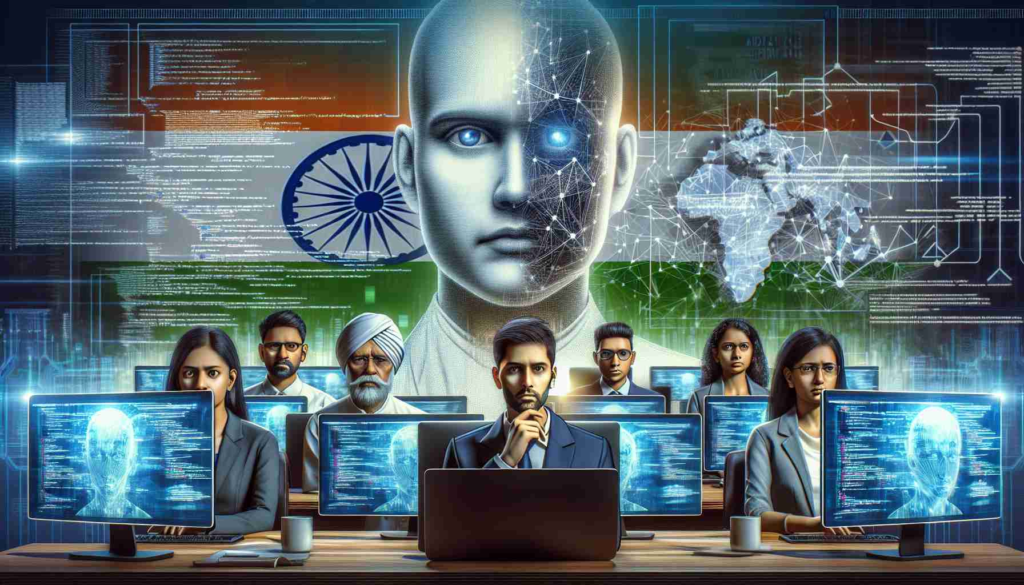India Faces a Severe Shortage of Cybersecurity Talent as AI Bolsters Defense Strategies


Summary: Amid an expansion of digital operations in India, organizations are confronting an alarming shortage of cybersecurity talent. This deficit persists despite the integration of AI into cybersecurity strategies to compensate for the talent gap and enhance defense mechanisms against sophisticated cyber threats.
As India hurtles into a more digitized economy, artificial intelligence (AI) is swiftly assuming the role of a digital sentinel for cybersecurity measures. Nevertheless, AI is augmenting rather than supplanting human expertise in this field, fueling the burgeoning demand for cybersecurity professionals in a country wrestling with rampant cyber-attacks. By 2025, India’s cybersecurity sector is estimated to experience a 30% shortfall in skilled personnel.
Businesses are increasingly adapting AI to hone their cybersecurity defenses and fill the skills gap. Industry leaders recognize the necessity for security analysts to be adept in harnessing AI technologies. As cybersecurity threats evolve rapidly, organizations must prepare their workforce for an integrated AI-enhanced security approach.
Presently, India’s cybersecurity labor force numbers roughly 300,000, a significant increase from previous years, and projections suggest a high demand for related competencies. In particular, specialties such as threat intelligence, incident response, and penetration testing are expected to be highly sought after.
A recent report by the Data Security Council of India highlighted an impending need for approximately 790,000 more cybersecurity experts in the country. Industry experts are also flagging an increase in cyber-attack incidents directed at government entities, startups, and SMEs, underscoring the importance of robust cybersecurity defenses.
Furthermore, enterprises are not only scouting for domestic talent but are also exploring international markets like Singapore, the U.S., Switzerland, and Israel for qualified cybersecurity personnel. Efforts are being made to bridge this gap through an array of collaborations with educational institutions, industry certifications, and internal training programs.
While AI continues to reshape the cyber threat landscape, making some attacks more accessible and ferocious, Indian organizations and cybersecurity professionals are being urged to stay relevant and prepared by becoming proficient in AI and related cybersecurity applications.
Industry Growth and Market Forecasts
The cybersecurity industry in India is experiencing a pronounced growth trajectory, driven by the widespread adoption of digital technologies and the subsequent increase in cybersecurity risks. This expansion is part of a global rise in cybersecurity spending, as organizations across the world enhance their investment in protecting their digital assets. The global cybersecurity market is projected to grow to $248.26 billion by 2023, according to a report by MarketsandMarkets.
As businesses continue to integrate AI and machine learning into cybersecurity practices, they can manage larger datasets and identify threats more quickly than traditional methods. However, the increasing sophistication of cyber threats requires a well-trained workforce capable of responding to incidents and managing the technologies that prevent them.
Issues Related to the Cybersecurity Industry
One of the most pressing issues in the cybersecurity industry is the talent shortage, which is not unique to India but is a global phenomenon. This shortage can lead to increased risk of data breaches and a higher workload for existing staff, potentially resulting in burnout and reduced effectiveness.
Another concern is the evolving nature of cyber threats. As hackers become more adept at using AI for malicious purposes, there’s a constant cat-and-mouse game between threat actors and cybersecurity professionals. AI systems can also generate false positives, which require human intervention to verify, again pointing to the need for skilled analysts.
Furthermore, privacy regulations such as the European Union’s General Data Protection Regulation (GDPR) and various other national data protection laws have made the role of cybersecurity even more crucial, as non-compliance can lead to substantial fines.
Efforts to Bridge the Talent Gap
India’s government and private sectors are intensifying efforts to develop the necessary skills among the workforce. Initiatives include partnerships with academic institutions to offer cybersecurity courses and encouraging professionals to acquire industry-recognized certifications.
In addition, multinational companies in India are increasingly setting up their global cybersecurity centers, contributing to the growth in demand for cybersecurity professionals. This has provided a stimulus for job creation and skill development within the sector.
To learn more about global trends and initiatives in cybersecurity, visitors can explore the following authoritative sources:
– INTERPOL: The International Criminal Police Organization provides insights into global cybercrime and the international efforts to combat it.
– Cybersecurity Insiders: A platform offering the latest news, comprehensive reports, and insights on cybersecurity trends.
– (ISC)²: The International Information System Security Certification Consortium offers cybersecurity certifications and education.
– ITU: The International Telecommunication Union shares information on international standards and guidelines related to cybersecurity.
The intersection of AI and cybersecurity in India represents both a challenge and an opportunity. While AI will continue to transform the industry, organizations must remain vigilant and proactive in nurturing the next generation of cybersecurity professionals.

Roman Perkowski is a distinguished name in the field of space exploration technology, specifically known for his work on propulsion systems for interplanetary travel. His innovative research and designs have been crucial in advancing the efficiency and reliability of spacecraft engines. Perkowski’s contributions are particularly significant in the development of sustainable and powerful propulsion methods, which are vital for long-duration space missions. His work not only pushes the boundaries of current space travel capabilities but also inspires future generations of scientists and engineers in the quest to explore the far reaches of our solar system and beyond.



